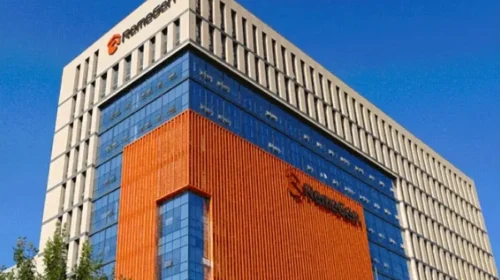Facing revenue crisis, Ascletis Pharma tries to bulk up with obesity drugs

The drug maker failed to generate any revenue in the first half of 2024 even with three major commercialized products in hand
Key Takeaways:
- Ascletis Pharma has shifted to weight loss drugs, but its products have only been approved to enter the clinical stage and will require several years to generate revenue
- The company currently holds 2.12 billion yuan in cash, which it says can fund its R&D and operations for the next five years
By Molly Wen
Ascletis Pharma Inc. (1672.HK) made history when it became the first listed company under a new Hong Kong Stock Exchange rule waiving a profitability requirement for promising drug startups. But the company’s path since then has been anything smooth, as some of its core products failed in their trial phases and others sputtered, including its Covid drug that rapidly faded with the pandemic’s end. Its financial report for the first half of 2024 showed its three major products approved for sale recorded zero revenue.
In a move to fatten up its top line, Ascletis announced last week it would enter the obesity drug space. Clearly, the company is eyeing the hottest slice of the pie in the weight-loss market, hoping to copy the big success of glucagon-like peptide 1 (GLP-1) analogs like Ozempic.
The announcement stated Ascletis will chase its latest ambitions with ASC30, which it independently developed and is the first and only small molecule GLP-1 receptor (GLP-1R) agonist that can be dosed once-monthly subcutaneously or once-daily orally to treat obesity. Such flexibility would undoubtedly appeal to patients, allowing them to choose how to take the drug based on their weight management approach, lifestyle, and convenience.
According to the company’s preclinical studies, ASC30 is two to three times more potent in vitro against GLP-1 when compared with Orforglipron, an oral non-peptide GLP-1R agonist developed by Eli Lilly (LLY.US). The studies also show that in its intravenous glucose tolerance test conducted on non-human primates, ASC30 stimulated statistically and significantly more insulin secretion compared with Orforglipron.
However, it’s worth noting that ASC30 is currently just in its in vitro and animal experiment stages, and its risks and effectiveness for humans have not been studied. The announcement said the company’s investigational new drug (IND) applications for ASC30 tablets and injectable ASC30 were cleared by the U.S. Food and Drug Administration (FDA) in July and September this year, respectively. But top-line data from the clinical trials isn’t expected until the first quarter of 2025. In other words, it will still take at least a few years of R&D before either form of the drug can be approved for sale and become a new money spinner.
As news of the clinical trial made the rounds before the official announcement, Ascletis shares rose for two consecutive days after flatlining for quite a while. That included an 18.4% surge on Sept. 16, followed by another 1.9% rise the next day. But even after those gains, the shares still currently hover around HK$1 – a far cry from their all-time high of HK$14.90 shortly after the company made its landmark IPO in 2018. Its stock is now down by more than 90% from its listing price, shrinking its market value to about HK$1 billion ($128 million).
Nonstop whammies
When Asceltis first listed eight years ago, its hepatitis C drug Ganovo had been approved for sale in China, becoming the first innovative Class 1 targeted hepatitis C drug developed by a Chinese company. The company was hot property back then as its star product went head-to-head with three imported rival drugs, including Elbasvir and Grazoprevir from international giant Merck (MRK.US).
But Ganovo failed to make it onto the list of drugs covered by China’s national health plan in 2019 and 2020, while the three imported drugs were added after offering price discounts of more than 80%, dealing a bit blow to Ascletis. Then, another one of its hepatitis C drugs, Asclevir, also struggled to find an audience after being approved in 2020.
Ascletis has also struggled with promotion and finding lucrative partnerships. In 2018, it obtained exclusive rights for the chronic hepatitis B and hepatitis C treatment drug Pegasys from Roche (ROG.SW) for the Chinese market. The product contributed 85% of Ascletis’s revenue in 2021. However, the rise of new treatment regimens for the two forms of hepatitis forced Roche to pull Pegasys from the Chinese market in October 2022, depriving Ascletis of an important revenue source.
In September 2021, Ascletis launched its Ritonavir tablets in China during the pandemic. That drug, one of the two main ingredients in the Covid drug Paxlovid, once became a major contributor to its revenue, providing more than 80% of its 56.6 million yuan ($8.05 million) in 2023. But demand for the drug has faded sharply with the pandemic’s end, and fell to zero in the first half of 2024.
Fortunately for Ascletis, the company still holds relatively large cash reserves of 2.12 billion yuan, setting it apart from many of its more cash-challenged peers. Its R&D costs were also relatively low at just 130 million yuan in the first half of 2024. Its mid-year financial report said the company’s current funds were enough to cover its R&D and operations for the next five years. Its big cash cushion owes partly to termination of R&D for some of its drugs still in development to save money over the past two years.
In March this year, Ascletis announced the termination of its clinical research for ASC42, a Farnesoid X receptor (FXR) agonist, for the treatment of primary biliary cholangitis. According to the company, the results of its phase two clinical trial showed that ASC42 did not show a competitive advantage compared to similar drug candidates currently in the development and registration stages.
In June last year, Ascletis also terminated its trials for two drug candidates to treat liver cancer and AIDS. The company’s current main R&D focus is on two drug candidates in the field of metabolic dysfunction-related fatty hepatitis, with both in the second phase of clinical trials. Meanwhile, its development of an acne drug is moving ahead quickly and has just started its third phase of clinical trials.
Ascletis’ dramatic fall from producer of China’s first homegrown hepatitis C drug to its embarrassing zero revenue from drug sales owes at least partly to missteps the company made in trying to commercialize its products. But some factors are also beyond its control and reflect mounting difficulties for companies in the fiercely competition global pharmaceutical industry.
That sea has long been filled with multinational giants with strong financial resources such as Novo Nordisk and Eli Lilly, all fighting turf wars around the world. Even more established Chinese drug companies like Innovent Biologics (1801.HK) and Hengrui Pharmaceuticals (600276.SH) have joined the fray. That leaves only tiny gaps for newcomers like Ascletis, which have far less cash and experience than such larger, better-established peers.
To subscribe to Bamboo Works weekly free newsletter, click here






